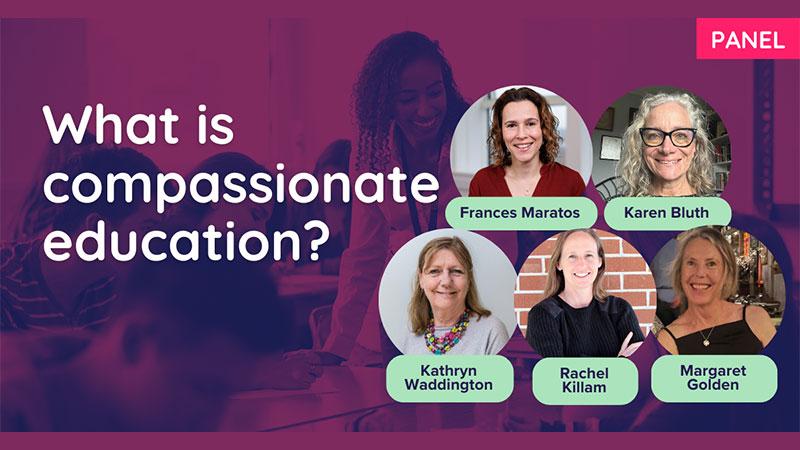Dr Kathryn Waddington, Emerita Fellow in Psychology at the University of Westminster, has joined fellow experts to speak at the Global Compassion Coalition’s What is Compassionate Education online event that took place on 30 May.

The Global Compassion Coalition is a charity that aims to create a world based on compassion, building a planet where the people on it are cared for and valued.
During the event that took place on 30 May, the panel discussed what compassion can tell people about how to approach education and how to integrate compassionate education into institutions. They highlighted how across the world there has been a shift from competitive or hierarchical approaches in education to a new framework based on the principals of compassion. This change has been driven by the desire to ensure educational environments inspire learning as well as teach young adults and children more about their emotions.
The event was split into three sections, with each one delving into a different aspect of this shift. The panel began with exploring the context behind this transition. They discussed what is already known about the experience of pupils and teachers in primary and secondary school as well as students and lecturers at university. They also suggested the best ways to approach the education of young people and what future changes can be expected.
In the second section the panel delved into what compassion can reveal about how best to approach education, looking at what role teachers should play and how to best approach exams and grading. They continued by discussing how to teach compassion, what the balance should be between self-compassion and compassion for others and highlighted what results are already being seen from research around this.

The event concluded with an exploration on how to make these changes become a reality. The panel discussed how to convince schools and universities of the benefits of incorporating compassion and finally what every person can do to create more compassionate educational environments from pupils and teachers to parents and practitioners.
Dr Waddington’s research has a strong focus on compassionate education. She has explored the need for critical approaches to compassion in higher education as well as researched into working with students as co-researchers in the development of compassionate learning and teaching practices and campus cultures. She is co-editor, with Bryan Bonaparte, Senior Lecturer in Psychology, of the forthcoming book Developing Pedagogies of Compassion in Higher Education: A Practice First Approach which will be published by Springer later this year.
Dr Waddington said: “It was a delight and honour to be invited to participate in this event and learn about good practice in compassion and education that is happening internationally. A big take home message for me was the need for universities to prepare for a seamless transition into higher education for students who have experienced compassionate education in school, as well as for those who maybe experiencing it for the first time. This highlights the need for compassionate campuses and cultures, and staff who role model compassion, care and kindness for themselves, for others and for the environment.
Matt Hawkins, Chief Operating Officer at the Global Compassion Coalition, added: “Compassion in education is getting a lot of attention and for good reason. The results from the work that our speakers have done demonstrate that introducing compassionate pedagogies into the education system can have profound effects for students and educators. Not only does it help them to reduce their own anxiety and risk of burnout - it changes classroom cultures so they are more caring and inclusive. To help us raise a generation high in emotional literacy and with strong mental wellbeing we would urge education leaders, teachers, lecturers and parents to engage with the growing movement towards a compassionate education - spearheaded by our fantastic panellists.”
This event directly contributes to the United Nations Sustainable Development Goal (SDG) 4: Quality Education. Since 2019, the University of Westminster has used the SDGs holistically to frame strategic decisions to help students and colleagues fulfil their potential and contribute to a more sustainable, equitable and healthier society.
Watch the full panel discussion on YouTube.
Find out more about Psychology courses at the University of Westminster.


